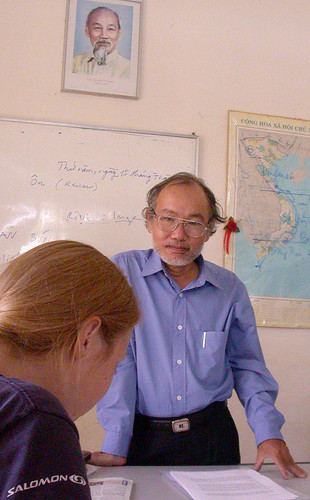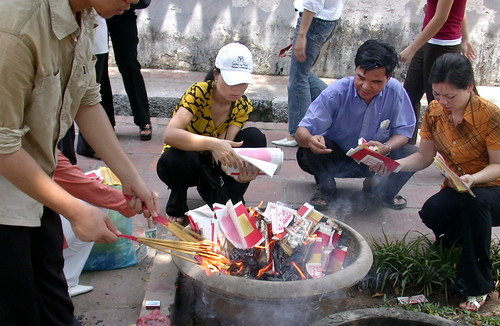
DANANG, Vietnam – On any given day, American students remain standing until their Vietnamese professor gives them permission to be seated.
On this muggy July 2004 afternoon, Vo Van Thang, an English professor at Danang University, is lecturing on ancestor worship.
While there are several religions and a small number of Muslims here, every single person worships their ancestors.
"It looks like a religion but it's not religion," Thang says.
Most houses have an altar to worship ancestors and each village has an altar to worship the ancestors of all the villagers. "The city also has altar," he adds. Meanwhile, every public building has a portrait of former Vietnam President Ho Chi Minh hanging in a prominent place, just like the one above the professor’s right shoulder.
College students from the United States spend a semester earning credits in Vietnamese history and culture through a one-of-a-kind partnership with SUNY Brockport and Foreign Affairs in Danang.
Unlike American co-eds, Vietnamese college students never ask their instructors questions because it is seen as an insult to the instructor, that he is inadequate at his job. This is a country where deceased professors are worshiped as if they are gods.
And in the home, the most important item on an altar are a bowl for josstick, or incense, and a pair of candlesticks.
When burning, the josstick smoke carries prayers or good messages to the heavens. “Every night, even in the city, people are outside burning incense, even in the tree,” Thang said.

Rather than being fixated on the past, the worship focuses on the dead having a stake in the continuity of life.
Cung Gio is known as the ceremony of the dead, when families and neighbors come together for a party. Tet, or the Vietnamese New Year, is the most important time to worship ancestors, when they “come back and take part in the festivities,” Thang says. “The altar is dressed with new flowers, food, liquor. It’s the time to refurbish the home, buy new clothes...” Another party is thrown on the third day of Tet to see off the ancestors. The Vietnamese typically worship three generations of their deceased relatives.
The Roman Catholic church attempted to stop ancestor worship when it arrived in Vietnam 400 years ago, Thang said. The church later conceded, allowing the people to partake in local superstitions, as long as it is done in the home.
There are other beliefs that the burning of gold or silver paper has the power to send riches to to the sky. Today, people even burn paper cell phones to speed the communication.

No comments:
Post a Comment